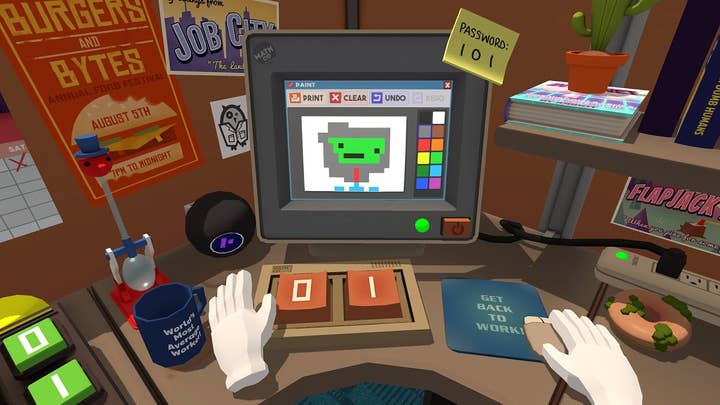How to transition from working from home to being a remote studio
Due to the coronavirus crisis, leading games studios are having to learn to work remotely. But how do you make a success of working from home?
Learning to develop games with a distributed team has never been more important. With the COVID-19 crisis, developers are closing their physical doors and getting their staff to operate remotely -- a transition that would typically play out over years, and is now being enforced almost overnight.
But the industry has been gradually heading in this direction. Developers like Moon Studios, which has 80 employees, operate entirely without a headquarters. Indie teams are already accustomed to working from home. And there are tech and tools being developed constantly, particularly in the cloud, to enable game creators to work in this way.
But the transition is not without its challenges. The GamesIndustry.biz Academy asked those with the experience to share their advice on how to guide a games studio toward remote working.
Remote working improves your recruitment options
Outside of the obvious virus-related reasons, there are some clear advantages to having a distributed team.
"If you put all these people from different backgrounds in one room, the outcome is going to be amazing"
Nada Hafez, Rubikal
One of the biggest is that you can attract talent from almost anywhere. You're not limited to hiring staff from your local area, or people willing to relocate themselves and their families.
"We hired people away from Blizzard, Riot, Disney, and so on," says Moon Studios head Thomas Mahler. "And the pitch that we made was simply: 'Hey, we have a good salary, but the nice thing is that you can work from home'. People didn't have to relocate or uproot their family. Doing that really helped us be able to attract this talent pool.
"You have pools of talent like in Los Angeles, but even then, you're saying goodbye to all the European talent. The US shot itself in the foot a little bit because of how difficult it is to get a visa. You might have extremely talented people in Europe who just can't get a work visa. We don't have any of those problems."
If you're eager to build a more diverse team with more varied thoughts and experiences, being able to recruit from anywhere can help enable this.
"Remote work is amazing," says Nada Hafez, product manager at external software development house Rubikal, in Alexandria, Egypt. "If you put all these people from different backgrounds in one room, the outcome from this brainstorming session is going to be amazing. Let alone that you're putting people from different countries, different continents of the world, where each of them comes with a different experience, background, work culture, all of that... Even if it's a virtual chat room, you can find endless streams of ideas and the sky here is the limit. Everyone's going to surprise you."

Finding the right tools and technology
Technology can replace many of the things that you can do in a physical location, and there are plenty of off-the-shelf options available. However, more established remote studios have taken to building tools that are tailored to their specific needs.
"We built our own tool, which is called Apollo," Mahler says. "It is a really cool suite, where you can put in your user credentials and get access to a lot of tools and knowledge, and you can see what everyone is working on, there is a to-do list... All those kinds of things. We also regularly use Skype and Teams -- the sort of things we don't have in Apollo yet.
"The goal is to expand Apollo to feature all of that, so we can keep working in this distributed fashion and have this one tool that does everything."
"We've provided desks, chairs, transportation of hardware and, where required, are improving network connections"
Carl Cavers, Sumo Group
Building your own technology requires time, and to begin with it will make more sense to focus on what's available in the market. There is a plethora of communication tools, such as Teams, Slack and Zoom, and project management tools and services like Monday.com. Plus you'll find the tools your studio is already using are capable of being used remotely.
"It really does depend on how the studio is setup," says Mark Ragon, IT director of Dlala Studios, which became a remote studio in less than three days following the COVID-19 outbreak. "For example, are services like source control, continuous integration and documents hosted locally or are they hosted online?
"For us, we like to keep a lot of this in-house, so providing a secure method of connecting to the studios network is crucial. This means a secure VPN connection, a fast internet connection both in and out of the studio, remote support tools, and obviously a reliable source control server. Software we're using includes Source Control from Perforce, Continuous Integration from Jenkins, and Screensharing for remote support by TeamV."
For a lot of studios switching to remote working during the coronavirus crisis, the main focus has been on security and reliability.
"The overriding considerations for us are security and resilience within the network and VPN environment," says Carl Cavers, CEO of Sumo Group, which was forced to adopt working from home due to the coronavirus. "Our day-to-day development tools remain the same, ensuring our teams experience as little disruption as possible."

It's not just about the tools and services, but the physical technology required by the staff, too. Even if the cloud removes the need for super powerful computers in some cases, a strong internet infrastructure will be essential.
"What worked for us was to determine what the staff's needs were at home to be able to continue to work efficiently," says Ragon. "We gathered a few questions that we would discuss with each member of the team. And they were: Do you have an internet connection at home? What sort of internet speed do you get at home? Who is your home ISP? What is your 4G coverage like? What sort of speeds do you get? Will you be able to connect via an ethernet cable, or will you be using WiFi?"
"Unfortunately for us, a few of the team didn't really have an internet connection that we deemed adequate, so ended up having to purchase some 4G routers and sims to provide a better internet connection. We had the odd teething issue with the team -- mostly DNS related, it's always DNS related. But [we] managed to get the entire team home and working in two-and-a-half days.
"As pretty much all of our staff are not setup for home working, we had to loan out equipment from the office to everyone. Thankfully we already had an asset management system in place, so everything has been assigned and we can keep track of who has what hardware.
"Then there are also the little things that maybe you don't think of initially -- like people not actually having an area to accommodate their work setup at home... We had to provide desks to any staff members who didn't have an existing space for that and make sure they had the appropriate chair to sit in."
The importance of video calls
"Having meetings on camera and seeing faces helps you empathise with the people you're speaking to"
Enrique Alejandro "Alejo" Pérez, Endless
One piece of technology that is essential for a remote team is a reliable video call system. There are plenty of options out there, whether it's Microsoft Teams, Skype, Zoom, Discord, and even Facebook. Whatever service you use, video calling will prove vital in maintaining good relations with the team.
"Having meetings on camera and seeing faces helps you empathise with the people you're speaking to, to consider them as people with emotions," says Enrique Alejandro "Alejo" Pérez, who works at Endless in Colombia.
Michael Zillmer, co-founder and COO of InnoGames, adds: "Enabling the camera option increases communication by allowing for facial expressions and other visual cues to be shared in real time and decreases the chance for misunderstandings. The video aspect also allows for more personal social interaction and is the best format in these challenging times. That being said, the audio has priority in video calls when the connection is spotty."
Zillmer adds that, in video calls, it's even more important to have an agenda and to avoid unnecessary people being in the call -- more people dialling in typically lowers the quality of the call. He also recommends that if you're using a new system, make sure to test it beforehand to avoid ten minutes of downloading updates or add-ons.

Zillmer also suggested using captions: "Difficulty hearing, unexpected disruptions, or noise in the background can be worked around by turning on the captions option, making sure you don't miss what is being said. This can avoid the all too common: 'Sorry, I missed that' or 'Can you repeat that?'
"Working remotely does not mean working alone. Taking full advantage of video conferencing capabilities can allow for more efficient, productive meetings, while continuing to connect colleagues no matter their physical location."
It's not just video calls -- communication of all kinds is vital when it comes to working from home.
"We have plenty of tools that we can use to discuss potential issues, be that over ticketing systems, email, chat or video calls," says Ragon. "We can monitor and access everything we need to remotely in order to troubleshoot various problems.
"We are having to put trust in the team to come forward with issues, maybe even quicker than they would normally"
Mark Ragon, Dlala Studios
"From an end user perspective, if no-one is highlighting the issues or communicating that they are having problems, it is a lot harder for us being remote. In the office, it can often become apparent quickly when there are unraised issues, but now we are having to put trust in the team to come forward with these, maybe even quicker than they would normally."
Avoiding conflict
Conflict, disagreements and misunderstandings are a common occurrence in the online world -- one look at Twitter will tell you that. It can be even more of an issue when you're talking with people from different cultures and backgrounds.
"I am not a native English speaker. I am from Austria and speak German, and a lot of times, I am writing something in a rather harsh way... or at least native English speakers interpret it that way," Mahler says. "But I didn't mean anything by it. If you just communicate with text that can happen when people can't get the right tone."
Perez adds: "Even when you all speak the same language, you need to understand the culture of the people you're working with. I would suggest someone starting to work remotely takes the time to learn a bit of their culture -- what they do, what they consider appropriate or not -- and try to be as sympathetic as possible."
One way to solve this challenge is to bring the team together at certain points in the year. It might be hard for a particularly massive organisation like Sumo Group, but smaller, targeted gatherings can work just as well.
"One of the things that we are doing to help with that is to do yearly team retreats," Mahler says. "We rent a big villa or something. Everybody sleeps there for a week. Everybody gets to bash their heads together and talk about what they would like to do with the company, and how we're doing with the project, and to find out how everybody else is doing. It's a way to do team building and get people to mingle with one another, and just really have a good time.
"That has been a huge success for us, because every time we have them, people are super motivated and that problem of people getting offended by things that are written down is rectified to a degree because if you know a person, then you probably know he meant something different."
"We try to have at least two 15 minute 'virtual cuppas' a day"
AJ Grand-Scrutton, Dlala
Dlala even has virtual tea breaks.
"We try to have at least two 15-minute 'virtual cuppas' a day," says CEO AJ Grand-Scrutton. "This is where someone will post that they're having a cup of tea, jump into a team Discord voice chat and anyone that wants a break can join in. We chat about work and life in general, basically trying to emulate the tea breaks we all take regularly at Dlala [physically]."
How to overcome loneliness and approach mental health
Working from home can be a great fit for some people, particularly those with families and active social lives. But it isn't for everybody, and it can be a challenge in terms of mental health.
"It can get a bit lonely for those who don't have a family," Mahler tells us. "You're sitting in an office day in and day out, and just talking to people over the internet -- that's not for everybody. We had an amazing animator who I hated to see go, but he couldn't handle it. He felt like the roof was falling on his head. It happens, but it does happen rarely."
When Sumo Group transitioned to working from home, an emphasis was put on emotional well being.
"The initial advice we're giving is for our people to focus on their wellbeing, stay connected -- socially as well as work-wise -- and maintain a routine," Cavers says. "These can be stressful times for everyone, especially if they have immediate family concerns to deal with. Communication within teams, individuals and management is even more important than usual. We're encouraging people to raise any issues, whatever they may be, as soon as they can.

"Some people will relish the opportunity to work from home -- the lack of distraction, bespoke environment -- whereas others may have additional responsibilities due to the impact of the virus, such as children no longer going to school or nursery, or living with key-workers. We live by our values and will support all of our people whatever their situation.
"As the dust starts to settle, we want people to get into a routine where they can. Flexibility is key here and our different teams are approaching this in different ways and sharing their experiences. It's really important to help fill the void that people will naturally have from the lack of social interaction from being in the studios. It's brilliant to see lots of virtual get-togethers: virtual pubs, coffee mornings and board gaming... They are part of the Sumo Group family, even though they may not meet face-to-face for weeks or months."
Indeed, Innogames stresses that routine is an important part of working from home.
"While flexibility is important, setting boundaries is equally important to one's wellbeing
Michael Zillmer, Innogames
"Most people have a weekday routine, typically beginning with a morning cup of coffee and the commute to the office," Zillmer says. "The transition to home office can lead to some unease for those who are not as familiar with working remotely, which is why it is important to keep a sense of normalcy and structure.
"Mirror your weekday routine as much as possible while in home office, and if you can't do something in person, look into virtual options. Jump on a quick video call with the colleagues you usually run into at the coffee machine. Take lunch and other breaks at the same time you would in the office. If you structure your day in a certain way -- with back-to-back meetings in the mornings with afternoons set aside for other tasks, for example -- continue this at home."
Zillmer adds that ensuring boundaries are set between home and work life is also key: "It is easier to disconnect when there is a physical separation between work and home. With home office, work is just in the other room, which can blur that separation, highlighting the importance of a designated workspace. While flexibility is arguably more important when transitioning to home office, setting boundaries is equally important to one's wellbeing. Share your availability with your team, but also be sure to properly disconnect outside of those hours to recharge."
If you want to learn more about how to approach mental health issues in the workplace, you can read our Academy guide on the topic. It addresses ways to make sure remote workers don't feel isolated, among many other practical pieces of advice to improve your staff's wellbeing.
Making sure everyone's voice is heard
Even within studios that don't work remotely, it can become difficult for team members to express ideas. It's even more of a challenge in the online space where there's no obvious person to pitch an idea or concept to.
"We try to make sure that people can, reasonably, really speak up," says Mahler. "If I am going for some design or something, then I better make sure that I really know what I am talking about, because there might be people who will completely shoot me down."
Cavers adds: "One of the benefits of being a large organisation -- with multiple sites across multiple time zones -- gives us is the experience and tools to share ideas without the need to be in the same space... It's still early days, but we're very proud of how everyone within Sumo is adapting to this challenge we're all facing."
According to Grand-Scrutton, senior management must be available to the team whenever possible: "I go on about transparency and Dlala being an open environment a lot. If anyone on the project -- not just the internal team -- has any concerns or thoughts, they have a permanently open forum to raise them through Slack channels dedicated to features, a Q&A channel to highlight any wider questions, and also having the ability to jump on a call with any senior member of staff... at any point."
Additional reporting by Brendan Sinclair
